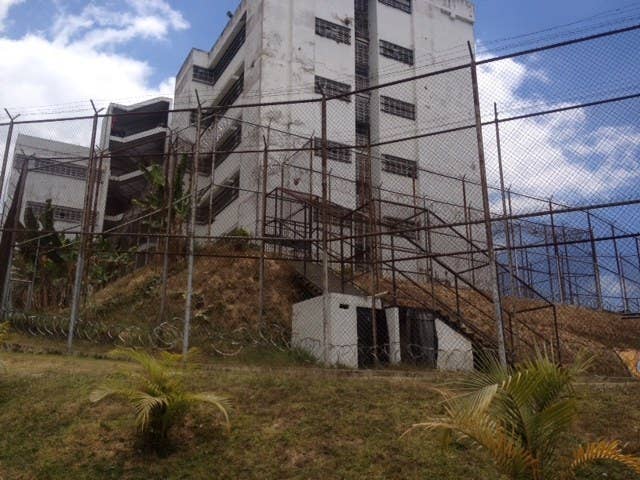
LOS TEQUES, Venezuela — The prison where Leopoldo Lopez is being held sits high on the mountainside above the small city of Los Teques, about an hour away from the Caracas streets where he gave himself up to authorities over a month ago.
The Ramo Verde prison is a military prison — but it has a history of housing political prisoners, and it's where Lopez, the charismatic Harvard-educated Venezuelan opposition leader and head of the Voluntad Popular (Popular Will) party, is jailed on charges of conspiracy and arson (other charges for murder and terrorism have been dropped). Lopez, who turned himself in during a dramatic protest on Feb. 19, has had to sit out most of the demonstrations he spearheaded at the beginning of Venezuela's current period of anti-government unrest. His isolation has put him out of the game at a critical time. Venezuela's protesters are still out in the streets, but six weeks of demonstrations have produced no results, and the man who has championed the long shot "La Salida" (the exit) strategy of demanding that President Nicolas Maduro resign is not there to see whether it might work.
Every week, the Lopez family visits him in jail, where they're allowed to spend a few hours alone with him and bring in lunch. On Sunday, his sister Diana drove there with her daughter Sofia in tow. Lopez had grown a beard, Diana said, and is learning to play the cuatro, a Venezuelan guitar. The family has not been able to win Lopez, a religious Catholic, the right to attend mass and to have his priest visit. He is allowed one hour of exercise outside per day.
The family has to go through stringent security checks every time they visit. On Sunday, guards did not allow Diana to bring in a list of questions from BuzzFeed addressed to Lopez. They had previously allowed the family to bring in questions from a Venezuelan outlet, but rejected BuzzFeed's questions because they were written in English and mentioned Maduro.
"They took the paper away and said, 'These are in English?' And I said, 'I can translate them,'" Diana said the next day. "Well, that's another violation. It's a violation of his correspondence. The constitution says people in jail should have privacy of correspondence."
Lopez has managed to send out messages from prison; he gave a message to his wife in February to exhort protesters to stay in the streets, and wrote a New York Times op-ed that was published last week.
Amnesty International has said that the charges against Lopez "smack of a politically motivated attempt to silence dissent in the country" and has called his imprisonment an "affront to justice and free assembly."
Lopez, whose appeal to be released on bail was rejected Friday, said during an emotional speech before his arrest in mid-February that "if they put me in prison, it'll wake up the people." It's unclear how much his arrest and incarceration have spurred Venezuelans to direct action. Protesters are still out on the streets, as they have been since Feb. 12 — but Lopez's arrest doesn't appear to have been a truly galvanizing moment for the students who make up most of the demonstrators. They are in the streets to protest the rampant food shortages and crime that have come to characterize modern day Venezuela. Violence related to the protests has left 39 people dead.
Yet those with whom BuzzFeed spoke expressed solidarity with Lopez. He is one of many prisoners who were involved in the protests whose release they are seeking.
"There is a mutual state of solidarity between Lopez and the students," Gaby Arellano, 27, a student leader from the Universidad de Los Andes and a member of Lopez's political party, said during an interview at the Voluntad Popular office, where a life-size cardboard cutout greets visitors in the foyer. "They were with him in the streets on the 12th and they know he's innocent."
"This is not about changing the color of the problem," said Alfredo Graffe, 20, a student leader from Universidad Simon Bolivar. "Now, Venezuela is completely red," he said, referring to the color associated with Chavismo, the populist ideology launched by the late Hugo Chavez. "We are not proposing to change it for yellow, as [opposition leader Henrique] Capriles, or orange for Leopoldo Lopez. We are trying to solve actually the problem."
"In Venezuela there's no justice," Graffe said, turning to Lopez's case. "And he represents that. He received abuses of the government and we will be there for him — not because he is a political leader, because he is a Venezuelan who is one of the Venezuelans who is unjustly in prison." Opposition activists say hundreds have been arrested since Venezuela's protests broke out. At least two opposition mayors have been jailed.
Diana Lopez said that her brother did not enter prison with the goal of becoming a martyr.
"This is not a case about Leopoldo Lopez," Diana said. "This is about the Venezuelan people, and he was very emphatic about that."
